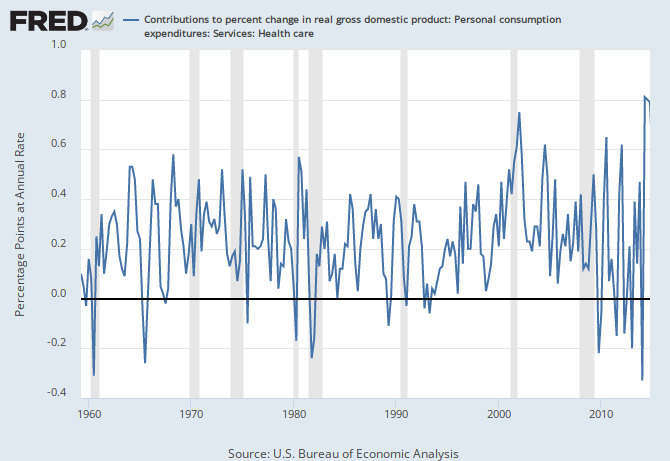Written by Steven Hansen
Early this week two posts hit my inbox within hours of each other – and I was thinking that the authors of these posts could not be living in the same world. One (Professor Paul Krugman) was attacking a Senator for misrepresenting / overstating the costs of Obamacare. The other author (Lance Roberts) told of the risks of increased healthcare spending on the economy.

Professor Krugman stated:
Whatever your overall view of the Affordable Care Act, one indisputable fact is that it’s costing taxpayers much less than expected — about 20 percent less, according to the Congressional Budget Office.
The link in the Professor Krugman’s quote states in part:
Remarkably, the growth of health care costs has slowed down significantly in recent years, enough so that budget analysts are having to reconsider their fiscal outlook of the law.
Lance Roberts was implying the opposite.
It gets better because in the fourth quarter total spending on healthcare in chained dollars was a whopping $35.3 billion. An all time record!

Honestly, one quarter of data is not evidence. But here are a few FRED graphs to illustrate what is going on. The first graph indexes health care costs to consumer spending. Health Care costs moderated during the Great Recession – but look at the last 12 months where there is now a obvious acceleration of health care costs to CONSUMERS.

Again, the significant takeaway from the above graph is that consumers are spending more of their budgets on health care. The FRED graph below shows a historically high health care contribution to GDP growth in 4Q2014.

Was this burst of health care spending caused by Obamacare? I cannot provide this answer specifically, but the pro-Obamacare folks love to say that Obamacare is and will be reducing medical costs (all evidence to the contrary is ignored). My position is that I believe in a socialized medical care system of some flavor that would be suitable for American tastes. Denial of medical treatment is not acceptable any more than forced enrollment in government mandated private health care insurance with few options.
The data is not showing Obamacare is reducing health care costs to consumers.
I am far from a health care expert – but I spend a majority of my time sifting through data looking for trends. There are no PROVEN laws in economics – all theories are “proven” in uncontrolled situations where all the dynamics were not fixed [so it is impossible to say what dynamic mix created the outcomes]. Obamacare supporters, detractors, and the Congressional Budget Office argued the economic advantages or disadvantages of the law with no real formula to use to determine the economic outcome. To argue that Obamacare would have had a net zero economic effect to consumers ignores that:
- the government was now FORCING everyone to buy private health care insurance – an insurer is a for-profit entity and in reality health care was now a tax on consumers;
- there was no changes made to the health care system to reduce costs – but it was believed (hoped) that requiring everyone to have insurance somehow would reduce costs;
- the middle and richer end of the population would now be paying more for insurance;
- the poorer end would now get inexpensive coverage (where many were not buying health care in the first place).
In the end, the majority of consumers are now spending more on health care based on the emerging evidence. As the USA economy is consumer driven, taking money from consumers is an economic headwind.
Finally, readers tend to fall in love with “theory” that supports their vision. Unfortunately, the talking heads out there may not be giving factual information. There seems to be four kinds of analysts / pundits:
- those that are trying to prove a point and ignore evidence to the contrary;
- those that are out to make headlines (usually by being negative about most things);
- those that are sloppy in investigating and deliver a half baked cake;
- those that do not care what the answer is – just want to understand.
You can decide what bracket to put everyone in.
Other Economic News this Week:
The Econintersect Economic Index for April 2015 is indicating growth will be sluggish. Most tracked sectors of the economy are expanding – but now there is contraction in some data sets. The negative effects of the recently solved West Coast Port slowdown (a labor dispute which had been going on for months) and bad weather continues to be seen in much of the raw data – and it will be an economic drag on 1Q2015 GDP and into 2Q2015. It is difficult to differentiate these transient issues (weather and labor) from cyclic economic conditions – but one could argue that transient issues are the cause of economic cycles.
The ECRI WLI growth index remains slightly in negative territory which implies the economy will have little growth 6 months from today.
Current ECRI WLI Growth Index
The market was expecting the weekly initial unemployment claims at 275,000 to 295,000 (consensus 285,000) vs the 268,000 reported. The more important (because of the volatility in the weekly reported claims and seasonality errors in adjusting the data) 4 week moving average moved from 300,250 (reported last week as 297,000) to 285,500. The rolling averages have been equal to or under 300,000 for most of the last 6 months. Note that this week’s release reflects the annual revision to the weekly unemployment claims seasonal adjustment factors. The seasonal adjustment factors used for the UI Weekly Claims data from 2010 forward, along with the resulting seasonally adjusted values for initial claims and continuing claims, have been revised.
Weekly Initial Unemployment Claims – 4 Week Average – Seasonally Adjusted – 2011 (red line), 2012 (green line), 2013 (blue line), 2014 (orange line), 2015 (violet line)
/images/z unemployment.PNG
Bankruptcies this Week: Altegrity,









